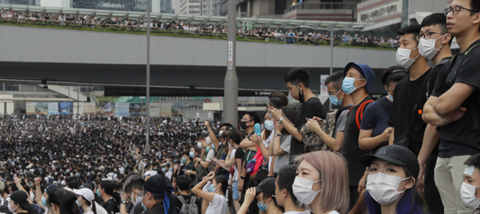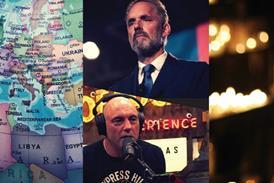
On Sunday, up to 2 million people marched through the streets of Hong Kong, calling on the government to formally withdraw proposals to amend extradition legislation. The numbers were astonishing: it was the largest protest the city has ever seen. Nearly 30 per cent of the population took to the streets.
As they marched, many of the protesters broke into Linda Stassen’s simple spiritual refrain, “Sing Hallelujah to the Lord”. One protester held up a banner, which read “Stop using baton or we sing Hallelujah to the Lord”; others had t-shirts - “Keep calm and sing hallelujah to the Lord”.
Journalists covering the story have been bemused by the way the protesters have sung the same four-line chorus on loop for hours.
The song’s use is not a sign of spiritual revival in Hong Kong, although it undoubtedly raises Christianity’s profile in the region. Instead the chorus points to the significant role of the Church in recent protests and the city’s politics. Hong Kong is not ‘post-Christian’, and religious leaders are not the object of mockery as they might be in the West, which helps to explain how the song could snowball.
The song was first sung by a small group of Christians during the first major protest on June 9. It swiftly became a mass rallying point, with Christians and non-Christians singing it non-stop for much of the week.
Why? There seem to be three reasons.
First, Hong Kong’s public order legislation currently has an exemption for religious gatherings: religious assemblies do not require police permission in order to take place. Joining together to ‘sing hallelujah’ thus provided protesters with some level of cover, preventing their gathering from being branded an illegal assembly.
Many have also described the way that the hymn calmed tensions between the police and the protesters. In a fraught and sometimes violent week in Hong Kong the singing of this simple spiritual song has at times calmed nerves.
After the most violent confrontations took place, many churches opened their doors to provide refuge for protesters. This has had a powerful impact on people. I spoke with a pastor in Hong Kong who wanted to remain anonymous, but said he'd heard one story of a policeman giving his life to Christ after hearing the song sung for six hours!
Thirdly, the prominence of the hymn reflects genuine unease among swathes of people in both the Protestant and Catholic churches about the government proposals which drew the protests. Christians have had an important role in Hong Kong’s democracy movement for decades. Many of the leaders of the Occupy Central Movement of 2014, including the currently imprisoned organiser, Professor Benny Tai, pointed to their faith as the basis for a belief in justice and the importance of advocating for basic freedoms and democracy. However, while some church leaders condemned Occupy Central, the proposals to amend the extradition law has found a much greater level of support among church leaders.
The proposals would have made it possible for the government of Hong Kong to extradite people to mainland China. The reason this caused concern was the sharp differences between the two legal systems. Chris Patten, the last British governor of Hong Kong, has said that the proposed law would have broken the “firewall” between the two legal systems: allowing people to be extradited from a city where a fair trial is possible, to a nation where the legal system is an arm of the state.
For people across Hong Kong who are proud of their robust judiciary, and the city’s reputation as a safe harbour, this has caused profound concern. Recent political developments have left people worried that the city is not sufficiently autonomous to reject extradition requests from mainland China, even if they were obviously unjust. The result is that there was profound fear that the political opponents, business leaders, and even Christian refugees from mainland China could be vulnerable.
Speaking in the House of Lords, the Bishop of Coventry noted that the legislation could have negative implications for efforts to support Christians under persecution in mainland China. He highlighted that: "Many Chinese people of religious faith fled to Hong Kong seeking sanctuary from the Chinese legal system and safety to practise their faith freely. Many Chinese people in Hong Kong today actively support religious believers in mainland China who are under, as we know, increasing pressure.”
This is not to say that there has been total unity. The pastor I spoke with described how although “in general” people are concerned by the legislation, “the church is there for everybody and we have behaved in that vein, allowing room for different stances.” Some Christians disagreed with the occupation of the streets on Wednesday in view of their interpretation of Romans 13.
He continued: “Our prayers are not politically driven. We are praying for Carrie, the government, the police - and the protesters. Much of our prayer is focused on the next generation and that they would have a hope in the future.”
There is much for us to learn from the Hong Kong church. What justice issues would or should bring Christians to the streets in the UK today to “Sing Hallelujah to the Lord”? As our nation looks increasingly divided, can we unite to pray?
Johnny Patterson is the Director of Hong Kong Watch, a London-based human rights organisation. You can find him on Twitter @Johnny_HKWatch.




























